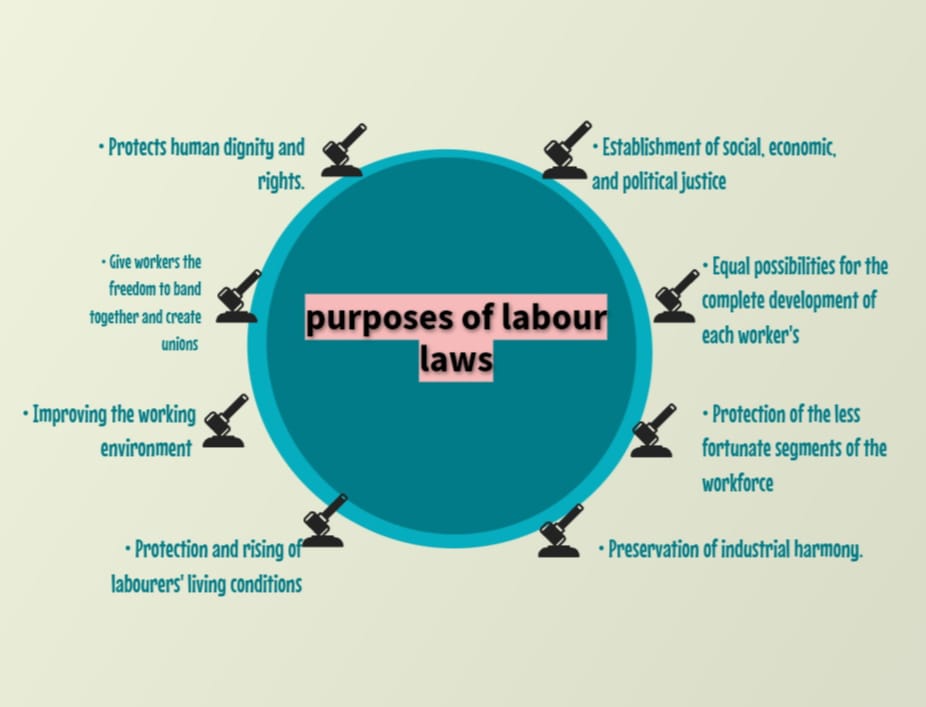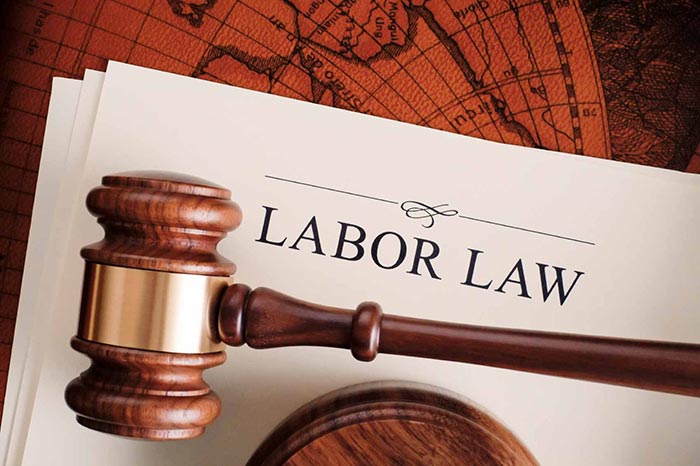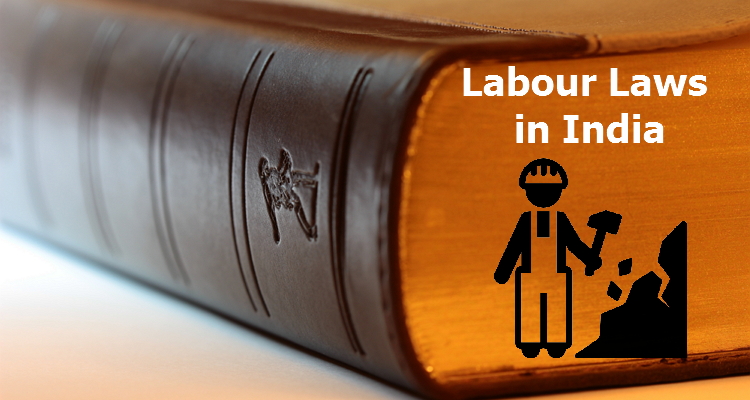Overview of labor law in India
Labor law in India: The world in which we live is dynamic and always evolving. This universe has always been governed by laws and regulations, but when society’s requirements increase as a result of social, economic, and technical advancements, new laws must be created right away. To function, every sector needs certain laws, which must be changed to reflect the new society and eliminated. “Life and laws have always travelled together, and they always must.” Law needs to be updated, renovated, and replaced on a regular basis, much like a fortress. Numerous labor regulations were enacted to improve the working conditions of laborers.
A major factor in regulating the relationship between employees and employers is labor law. It was incorporated into the Indian legal system to defend workers’ rights and prevent employers from abusing them. The labor laws of India regulate a wide range of topics, including salaries, holidays, demands, unions, and many other rights of employees. Labor law in India It is essential to forging a bond between the government and the labor force.
What is meant by labor laws?
“Labor legislation” is a body of laws designed to give the working class legal protections as well as limitations in the form of rules and regulations. It outlines the responsibilities and rights of the working class. Labor law addresses a number of topics.
- Certification of Labor Unions: A formal certification granting the labor union the authority to speak for all workers is given to them. This Union serves as the only representative in negotiations.
- Collective Bargaining: Through their unions, employees make demands of their employers over terms of employment, pay, leave, employee health and safety, and amount of working hours.
- Labor-Management Relations: The leader of any working organization must settle disputes among his workers since miscommunication would hinder his ability to accomplish his goals.
- Workplace health and safety: A better working environment will only motivate employees to give their all. It guarantees that they have a safe setting to work in and are not subjected to physical or psychological abuse by the workplace culture.
- Employment standards: These cover things like yearly vacations, working hours, and the provision of compensation to workers who are let go or terminated unfairly from their jobs.
The inception, progression, and advancement of labor law in India
The emergence of employment laws
The 18th and 19th centuries saw the beginning of the development of employment regulations.
The industrial transformation that occurred throughout those centuries gave rise to the labor law. The transition from rural to industrial culture brought about by the Industrial Revolution gave rise to a number of innovations. It was brought on by the market’s rising capitalization. The labor class and the employers were having a lot of issues at the time. Many nations passed labor laws that granted employees in establishments specific rights in order to protect the needs and demands of the working class. It shielded the workers from wealthy people’s exploitation.
The Western Countries were the ones who initially passed work regulations. The first nation where wealthy, upper-class employers mistreated laborers was England. This resulted from unchecked and uncontrolled capitalization. One of the factors contributing to industrialization was the laissez-faire system. The UK Parliament introduced bills pertaining to employment regulation in 1802, which led to the enactment of the labor laws in England, which prohibited child labor, limited working hours, and eliminated night shifts. Many other nations began enacting legislation pertaining to labor classes after England. Several nations passed legislation pertaining to welfare, health, safety, and working hours. Following the French Revolution of 1841, employment laws were implemented in a number of countries, including France. Germany
Following World War I, in 1935, Japan and the United States of America also enacted labor legislation.
The development of employment laws
The International Labor Organization (ILO) was founded in 1919, marking the beginning of the development of labor regulations. The Treaty of Versailles, whose goal is to create numerous policies and programmed connected to their works and its standards, was the reason for it. This institution, whose constitution was created by the Labor Commission, has 187 member nations worldwide. As a result, an executive body known as a tripartite organization was established, with members from the government, the labor unions, and the employers. The ILO investigated a number of labor-related concerns.
To defend workers’ rights, it established laws on working hours, night shifts, minimum age, unemployment, and maternity protection. It evolved into a UN specialised agency under the direction of an expert committee.
Prior to independence, work regulations existed in India as well. The Indian Slavery Act of 1843, the Indian Trade Unions Act of 1926, and the Societies Registration Act of 1860 were a few of the legislation pertaining to labor classes. The revocation of these restrictions followed India’s independence. All preceding Acts were superseded by the Industrial Disputes Act, 1947, which was passed in that year. To safeguard workers from all forms of exploitation, the Indian Constitution was amended to include a number of worker rights. The Constitution contains several labor-related rights, including as the right to fair and humane working conditions, the elimination of child labor and bonded labor, equal work and compensation, and maternity benefits.
The Indian Constitution protects these rights for workers who are employed by an establishment. The Indian Parliament codified and put into effect these laws in the 20th century. Over time, employment laws began to change in tandem with the times.
Creation of Labor Laws
The constant fight that employees at their employers experienced is where labor laws first emerged. Two social classes were not treated equally. There could never be an equitable contract signed between capital and labor. These behaviors needed to alter, and labor laws were formed in response to this need.
The Industrial Revolution marked the beginning of a new era. It changed the rural civilization into a materialistic, industrial one. It provided the masters with an excellent chance to achieve the best output from their employees. They took full use of them in order to get better results and more revenues.
The legislation did not provide any relief for the workers at that time. The majority of the agreements were established orally, and those who broke them faced harsh penalties and even jail time. Large-scale exploitation occurred due to lengthy work hours, pitifully low pay, mistreatment, and a lack of safety or welfare measures. Because the State never got involved in these issues, the employers took full advantage of the situation and severely mistreated the employees.
Although the Industrial Revolution brought about significant changes in society, it also left gaps in the political and economic spheres that needed to be filled by the community. Labor law in India Social devices were necessary to fill in the gaps, leading to the creation of work regulations. One could argue that labor laws are the obvious offspring of the Industrial Revolution.
The Constitution of Labor law in India serves as the fundamental basis for all other legislation, including employment laws. Labor laws are included in the concurrent list, which permits both the State and the Centre to enact laws pertaining to the working class. However, the State must ensure that its laws do not contradict with those of the Central government. Prior to independence, the Apprentice Act of 1850 was passed, allowing orphans to work after they were 18 years old. At the time that the labor laws were passed, workers were calling for greater pay and a safe workplace.
The Indian Parliament enacted new laws that limited the number of hours that employers could assign women to work at night, mandated that they pay overtime to their employees, outlawed child labor, and set a mandatory eight-hour workday with a four- or five-hour break. The purpose of the Factories Act of 1948 and the Trade Unions Act of 1929 was to protect every worker’s right while they were employed by an establishment. The workers were given a respectable wage and a good workspace in order to increase the output of the products. These Acts were passed in order to safeguard the rights of both employers and employees and to resolve disputes between them.

The purposes of labor laws
Establishing a friendly and peaceful relationship between employers and employees is the primary goal of labor laws. Its goal is to keep the public and labor organizations at peace, which will contribute to better working conditions and surroundings. The following are a few significant goals of employment laws:
- Establishment of social, economic, and political justice on all fronts for the working class.
- Equal possibilities for the complete development of each worker’s personality, regardless of caste, creed, religion, or beliefs.
- Protection of the less fortunate segments of the workforce who lack the resources to defend themselves.
- Preservation of industrial harmony.
- Protection and rising of laborers’ living conditions.
- Improving the working environment and shielding employees from all forms of exploitation, whether it be psychological or physical.
- Give workers the freedom to band together and create unions so they can bargain on behalf of themselves with their employers to improve their standard of living.
- Monitor the government’s involvement in the areas where social well-being is being worked on.
- Protects human dignity and rights.
India-specific factors
- Due to the fact that Indian labor was paid significantly less than British labor in factories and mills, manufacturers from Birmingham and Lancashire exerted pressure to create early labor laws.
- The independence warriors and nationalist leaders, who worked tirelessly to pass protective labor laws, provided the workers with tremendous assistance. The strain from the freedom struggle resulted in the formation of numerous laws.
- Even in the Preamble, Fundamental Rights, and Directive Principles of State Policy of the Indian Constitution, the leaders of the National Movement pledged to improve employment regulations and ensure equal justice for all after independence. The executives ensured that the workers would not be viewed as a commodity going forward.
Categorization of labor laws
- The Indian Parliament has introduced a number of employment laws statutes. It has been divided into the following four categories:
- The first is the industrial relations-based central legislation found in the Fifth Schedule of the Constitution.
- The Industrial Employment (Standing Orders) Acts of the States and Union Territories make up the second.
- The third is the Shops & Establishments Act (also known as the Factories Act, 1948), which is a state-specific statute.
- The fourth one is based on labor and social regulations from India, including the Maternity Benefit Act of 1961 and the Payment of Gratuity Act of 1972.
The necessity of labor laws
In India, many labor laws have been passed to guarantee that workers in both the public and private sectors, regardless of their occupation, have equal rights and sufficient pay to support them. They must have access to a safe and healthy working environment, and their fundamental rights must be upheld. It ensures that any problems pertaining to employment disputes between the employer and the employees are heard by a statutory authority that has the state’s prior recognition. It establishes that no employment is carried out unfairly and forbids the exploitation or enslavement of one person by another. Therefore, these labor regulations protect the public from being mistreated or abused by their employers. They are entitled to request assistance in the event that something similar happens. They have the option to file a lawsuit in court and pursue justice.
The Indian labor laws’ purpose
Labor law in India enacted by the Indian Parliament, labor laws are primarily meant to settle conflicts between employers and employees and preserve good relations between them. It is designed to be in line with the social and economic issues of the day. The following are some of the major goals of employment laws:
- It facilitates employment by establishing a legal environment.
- It is beneficial for workers and workers to talk about and find peaceful solutions to work-related issues.
- It contributes to providing a clean and healthy work environment for staff members, which raises output.
- It outlines some boundaries and guidelines that instruct them on what to do and what not to do, respectively.
- It outlines the obligations and rights that apply to both employers and employees.
Components of Labor Law
- Individuals are treated as citizens under general law in our nation, but workers are treated as such under labor law. The laborer’s had to deal with unfair circumstances for a very long period. Labor laws are completely skewed in their favor in order to protect their demands and interests; social justice is prioritized over general justice. It is entirely made with laborer’s in mind.
- The main focus of labor regulation is on issues that emerge in the workplace for workers, such as the amount of hours worked, wages paid, labor disputes, and working conditions. The primary targets of labor laws are employers and employees; other parties are largely unaffected.
As an illustration -While rules pertaining to marriages, property, and sales taxes impact an individual as a citizen, laws concerning wages, workers’ compensation for injuries, or women’s employment impact an individual as a worker. Laws are created in response to the various roles that people play; the “role-relation” test establishes whether a given piece of legislation is covered by general law, social law, or labor law.
- The security and equality of workers are the goals of labor laws. They strive to improve their living conditions and to advance the workplace culture in order to generate large profits that will benefit them as well.
- Labor laws, in contrast to other types of general legislation, must be updated and revised on a regular basis to remain relevant and current. There would be a gap with the demands of the industry today if there were not continuous modifications.

The constitutional context of labor laws
India is a Union of States and a quasi-federal country. Certain powers are guaranteed to the Centre, States, and Union Territories by the Indian Constitution. Thus, both the federal government and state governments are empowered by Article 246 of the Constitution to enact and carry out legislation. The Seventh Schedule of the Constitution has the following three lists:
List I, the Union List, consists of subjects for which legislation can only be made by the Centre.
List II, often known as the State List, consists of subjects for which only state legislation may be passed.
List III, the Concurrent List, is composed of subjects for which the State and the Centre may both enact laws and exercise authority.
The Concurrent List contains the laws pertaining to labor law. The following are the entries found in List III of the Seventh Schedule of the Constitution:
Entry No. 22: This entry discusses topics including labor and industrial issues as well as trade unions.
Entry No. 23: This entry discusses social security and social insurance, as well as employment and unemployment of employees.
Entry No. 24: This entry discusses topics pertaining to the welfare of workers, such as maternity benefits, provident funds, employers’ liability, workmen’s compensation, invalidity and old age pensions, and working conditions.
Entry No. 36: This entry addresses the legislation pertaining to manufacturing.
With the exception of the Industrial Disputes Act of 1947 statute pertaining to union employees, which is listed in List I – Union List, all of these laws are mentioned in the Concurrent List. As a result, it is clear that both the federal government and state governments have the authority to enact legislation pertaining to labor issues. Labor law in India the employment rules that apply to all Indian territories have been passed by the Indian Parliament. Thus, it is the same in every State. A few states have changed a few laws to better fit their requirements and convenience. There are a number of national statutes that apply nationwide, including the Factories Act, the Apprentices Act, the Employees’ State Insurance Act of 1948, and others that deal with bonuses, gratuities, provident funds, and other matters.
Conclusion
In India, labor laws are essential for protecting workers’ rights and maintaining good relations between businesses, employees, and the government. Labor law in India It is also regarded as an employment law that keeps employees safe from employer exploitation. The document outlined the rights and obligations of the employees. In addition to ensuring a healthy connection between the employer and employee and preventing problems, labor laws also establish guidelines for disciplinary action against indiscipline and many other things.

